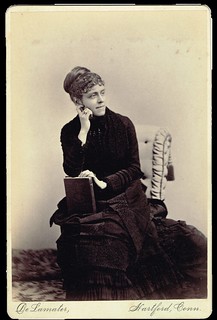Soon after their departure we had an accident; for no long journey in America would be complete without one. A coupling iron broke; and, after leaving the last car behind us, we waited for it to come up, which it did, with a crash that knocked everyone forward on their faces, and caused several old ladies to screech dismally. Hats flew off, bonnets were flattened, the stove skipped, the lamps fell down, the water jar turned a somersault, and the wheel just over which I sat received some damage. Of course, it became necessary for all the men to get out, and stand about in everybody’s way, while repairs were made; and for the women to wrestle their heads out of the windows, asking ninety-nine foolish questions to one sensible one. A few wise females seized this favorable moment to better their seats, well knowing that few men can face the wooden stare with which they regard the former possessors of the places they have invaded.
The country through which we passed did not seem so very unlike that which I had left, except that it was more level and less wintry. In summer time the wide fields would have shown me new sights, and the way-side hedges blossomed with new flowers; now, everything was sere and sodden, and a general air of shiftlessness prevailed, which would have caused a New England farmer much disgust, and a strong desire to “buckle to,” and “right up” things. Dreary little houses, with chimneys built outside, with clay and rough sticks piled crosswise, as we used to build cob towers, stood in barren looking fields, with cow, pig, or mule lounging about the door. We often passed colored people, looking as if they had come out of a picture book, or off the stage, but not at all the sort of people I’d been accustomed to see at the North.
Way-side encampments made the fields and lanes gay with blue coats and the glitter of buttons. Military washes flapped and fluttered on the fences; pots were steaming in the open air; all sorts of tableaux seen through the openings of tents, and everywhere the boys threw up their caps and cut capers as we passed.
Washington.–It was dark when we arrived; and, but for the presence of another friendly gentleman, I should have yielded myself a helpless prey to the first overpowering hackman, who insisted that I wanted to go just where I didn’t. Putting me into the conveyance I belonged in, my escort added to the obligation by pointing out the objects of interest which we passed in our long drive. Though I’d often been told that Washington was a spacious place, its visible magnitude quite took my breath away, and of course I quoted Randolph’s expression, “a city of magnificent distances,” as I suppose everyone does when they see it. The Capitol was so like the pictures that hang opposite the staring Father of his Country, in boarding-houses and hotels, that it did not impress me, except to recall the time when I was sure that Cinderella went to housekeeping in just such a place, after she had married the inflammable Prince; though, even at that early period, I had my doubts as to the wisdom of a match whose foundation was of glass.
The White House was lighted up, and carriages were rolling in and out of the great gate. I stared hard at the famous East Room, and would have liked a peep through the crack of the door. My old gentleman was indefatigable in his attentions, and I said “Splendid!” to everything he pointed out, though I suspect I often admired the wrong place, and missed the right. Pennsylvania Avenue, with its bustle, lights, music, and military, made me feel as if I’d crossed the water and landed somewhere in Carnival time. Coming to less noticeable parts of the city, my companion fell silent, and I meditated upon the perfection which Art had attained in America–having just passed a bronze statue of some hero, who looked like a black Methodist minister, in a cocked hat, above the waist, and a tipsy squire below; while his horse stood like an opera dancer, on one leg, in a high, but somewhat remarkable wind, which blew his mane one way and his massive tail the other.
“Hurly-burly House, ma’am!” called a voice, startling me from my reverie, as we stopped before a great pile of buildings, with a flag flying before it, sentinels at the door, and a very trying quantity of men lounging about. My heart beat rather faster than usual, and it suddenly struck me that I was very far from home; but I descended with dignity, wondering whether I should be stopped for want of a countersign, and forced to pass the night in the street. Marching boldly up the steps, I found that no form was necessary, for the men fell back, the guard touched their caps, a boy opened the door, and, as it closed behind me, I felt that I was fairly started, and Nurse Periwinkle’s Mission was begun.
Next: A Day
